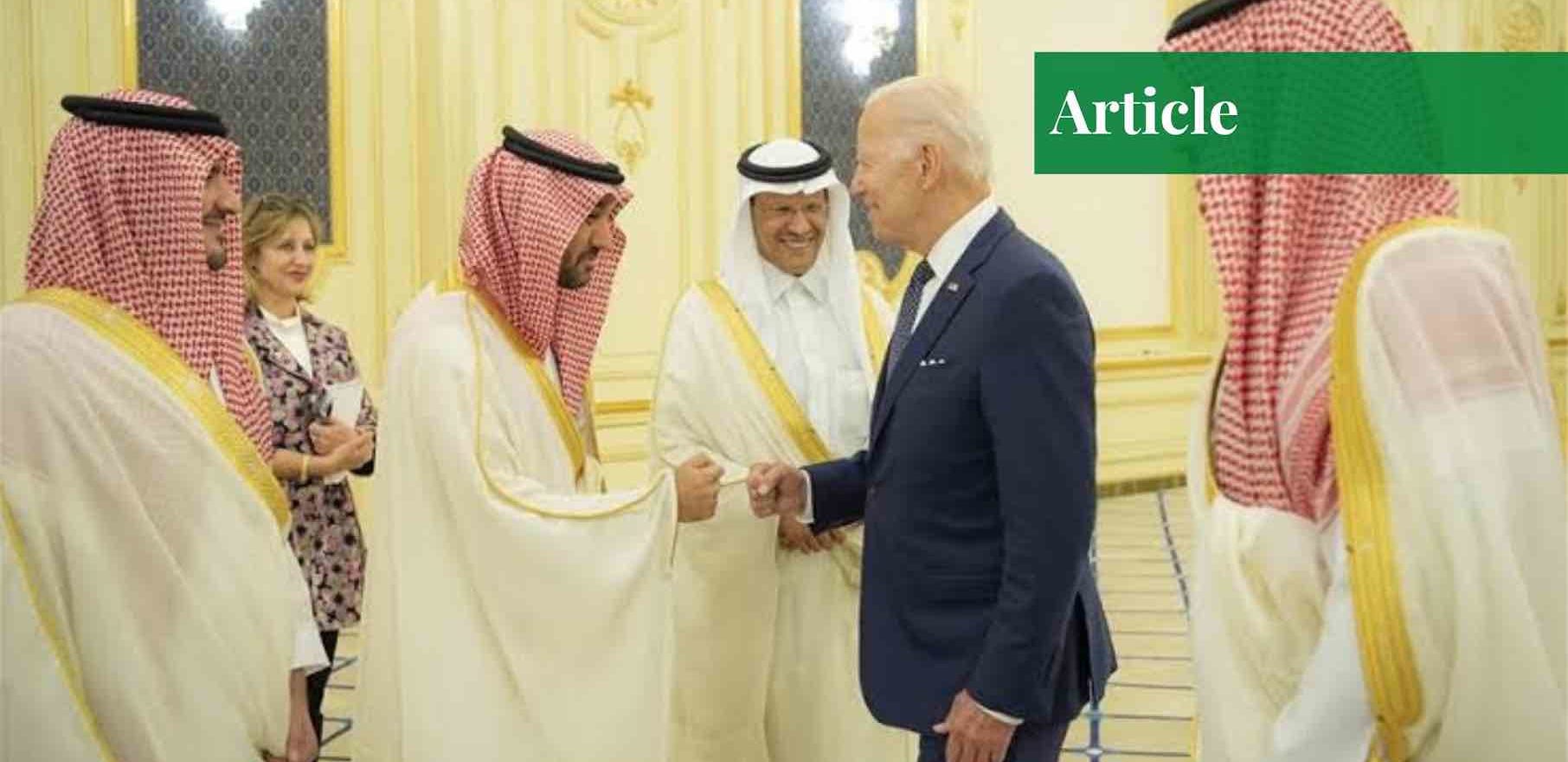Introduction
The visit to the Middle East by President Joe Biden proved to be highly controversial for many across the political spectrum, with some remarking that the content of these meetings embodied the increasing sentiment of waning American hegemony over global politics. Much of the trip, as most experts agree, was driven by the agenda to boost oil production in order to counter the global energy crisis that has significantly reduced Biden’s popularity.
This crisis, coupled with the vacuum created in the Middle East that may lead oil producers to shift towards Russia and China, may also have catalyzed this re-prioritization of the Middle East after 16 months of non-engagement. However, the White House — and the President himself in his Washington Post op-ed — downplayed this agenda and instead focused on the need for America to involve itself in the security and economic integration of a region it considers a strategic asset.
Whatever the reason for his trip may be, the consequences were quite polarizing, to say the least. Not only does this trip signify a complete reversal of Biden’s prior position on the Middle Eastern monarchies, but it is also a damning defeat for those defending human rights and for those calling for stabilization in relations between Iran and the Middle East.
In short, the trip is simply a reaffirmation of the status quo, one dominated by the geopolitical economic interests of the world superpower and its despot patrons.
Renewed Friendships and Animosities
For a president who called Saudi Arabia a ‘pariah’ country and who vowed to hold the state accountable for its human rights violations, Biden appeared quite at home at Mohammed Bin Salman’s palace in Jeddah, fist-bumping the despot and acting as if he didn’t make the public a promise to never directly engage with the Crown Prince.
Alongside MBS, the President also visited Egyptian President Abdal Fattah El- Sisi, the president of the UAE, and the Israeli Prime Minister. Fair to say, Biden left no stone unturned in reassuring the world of the United States’ relentless efforts to establish friendly relationships with all those governments that treat human rights as a paper tiger.
It was during his visits to Israel and Saudi Arabia that the President reinforced his idea of incremental normalization between the two countries. Such a move is the extreme extension of the Abraham Accords passed during the Trump era, which led to normalized diplomatic relations between Israel and the Gulf Cooperation Council (GCC) states like Bahrain and the UAE.
This normalization included the announcement of an open Saudi air space for Israeli commercial flights and the transfer of two Red Sea islands from Egypt to Saudi Arabia, a move that required Israeli consent. For the US, normalized relations between these two countries will provide long-term prospects of security and economic integration, which ultimately will be centered around regimes favourable to US interests.
During his trip to Israel, Biden met with Prime Minister Yair Lapid and what followed was an unsurprisingly jubilant set of guarantees made by both statesmen culminating in the ‘Jerusalem Declaration’. Central to this declaration is a commitment by Washington to never allow Iran to obtain nuclear weapons. However, this centrality is rooted in the principle of ensuring Israeli security.
Consequently, the strategic partnership also includes increased defence and missile assistance to the country alongside further commitments to defend the sovereignty of the Israeli state. Amidst the rhetoric of normalization, friendship, and integration, however, lay one explicit antagonism as well.
While Washington may have been unable to bring in more nations under Trump’s Abraham Accords, it was most definitely successful in another of Trump’s famous international diplomatic missions: the antagonization of Iran. Alongside the Jerusalem Declaration, Biden made a number of pressurizing statements that were reminiscent of Trump’s maximum pressure strategy.
The perfect example of this was his refusal to remove the Iranian Revolutionary Guard Corps from the list of foreign terrorist organizations.
Who Pays the Cost of ‘Security’ and ‘Integration’?
Diplomatic missions such as these are often presented in wholesome terms like ‘friendship’ and ‘creating regional integration’. However, in the case of this trip, in particular, there are very real human costs, which were treated with mere lip service by the US president.
It must be evaluated in advance that this limited shift back towards the Middle East suggests a complete reversal of the Biden presidency’s principled foundations for international diplomacy. Under his presidency, Washington has had a fragile vision of leading a coalition of democracies against the world’s autocratic governments.
Under this fictionalized vision, the US president emphasized that human rights would ‘be the core of our engagement with the world’. This makes little genuine sense if Biden is now coddling the oil autocrats of the Middle East, who have a history of flagrant disregard for international law.
As a matter of fact, it was on the day of Biden’s arrival in the UAE that a US citizen, who happened to be Jamal Khashoggi’s lawyer, was sentenced to three years of prison. When asked about the arrest and the alleged collaboration of the White House and Emirati authorities in it, Biden conveniently ignored answering. The president was forced to confront these inexpedient situations more than once during his trip.
The trip to Saudi popularly triggered a diplomatic incident, wherein the Saudi authorities claimed that Biden had not ‘pressed’ them on the assassination of Jamal Khashoggi, while the White House released a statement to the contrary that the issue was discussed at length. Whatever the reality, the fractured morals of the US government came back to bite when Bin Salman reportedly pointed out that the US had not done much about the targetted killing of Al Jazeera journalist Abu Akleh by the Israeli state.
While this embarrassed the government at home, the impact of potential renewed relationships on war-torn countries remained under the radar. The possibility of rapprochement between Riyadh and Washington may give free rein to the former in its war against Yemen, while those associated with the latter may enjoy uninterrupted ammunition sales and profits.
With regards to the Abu Akleh situation, the President made a diplomatic disaster by not visiting the journalist’s family and refusing to put any blame on the Israeli defence forces. In Israel, the self-interested nature of America’s international relations came to full display. Calling himself a ‘Zionist’, Biden refused to even turn an eye towards the internationally recognized human rights violations, illegal settlements, and apartheid-style policies of Israel.
While Biden did pay some rhetorical lip service to the Palestinian plight alongside a level of humanitarian aid which is exceptionally insignificant relative to the security aid Israel receives, his silence on structural issues was a testament to America’s priorities and interests in the Middle East. This silence is exceptionally remarkable in the case of the designation of six Palestinian NGOs as terrorist organizations by Israel.
This designation has been condemned by foreign ministries of nine EU states. However, it was not only overlooked by the US but the Jerusalem Declaration has also now given further leeway for Israel to implement harsh surveillance and securitization policies that will ultimately marginalize Palestinian voices even further.
What about the Oil?
Of course, it is quite inexpedient for the president of the ‘free world’ to tell his citizens that he is selling any semblance of principle and morality his country still possesses to hydrocarbons owned by tyrants. However, the importance of the oil crisis in prompting this trip cannot be overstated. Biden believes that the fruits of his trip will be seen in fuel prices in a few weeks, probably after the OPEC meeting in early August.
However, while the Saudis and Americans have pledged to stabilize the energy crisis, nothing beyond such vague sentiments was actually achieved. As a matter of fact, experts have started to believe that oil-producing countries in the Middle East may now be looking at Russia and China as stable and more promising partners for trade and integration. In such a scenario, it may be unwise for the US to be so dependent on those partners to maintain its global hegemony.
Conclusion
In reality, Biden’s trip to the Middle East achieved very little. No real agreement was reached to stabilize the oil crisis; the normalization of Arab-Israel relations remains a long-drawn pipedream; nuclear talks with Iran have stalled and show only dying flickers of hope.
America’s shift back towards the Middle East suggests a lack of genuineness in the principles espoused by the Biden government, and rather harks back to the previous eras of American interventionism. This is embodied by the continuation of the aggressive anti-Iran coalition, flagrant lack of regard for international law violations, and the blanket American support for its allies despite their oppressive nature.
However, this comes with serious consequences, borne mostly by ordinary Palestinians and Yemenis, but also by those subject to the worst aspects of the Middle East’s autocracies.
If you want to submit your articles and/or research papers, please check the Submissions page.
The views and opinions expressed in this article/paper are the author’s own and do not necessarily reflect the editorial position of Paradigm Shift.



















